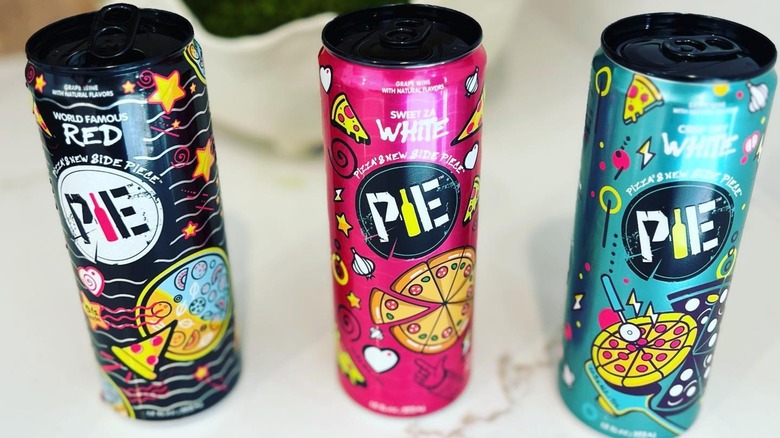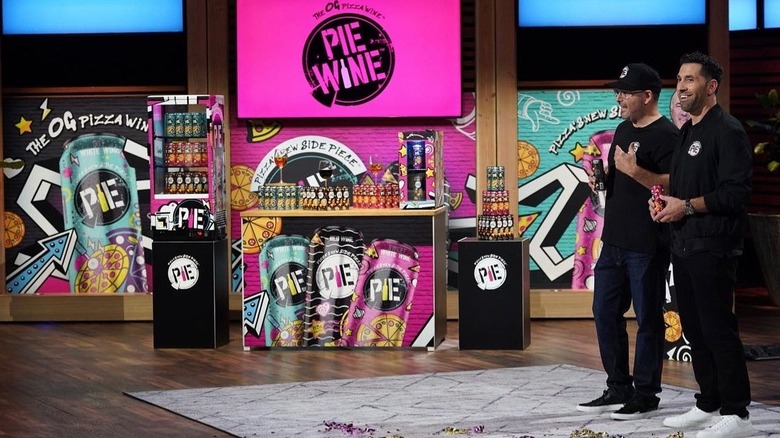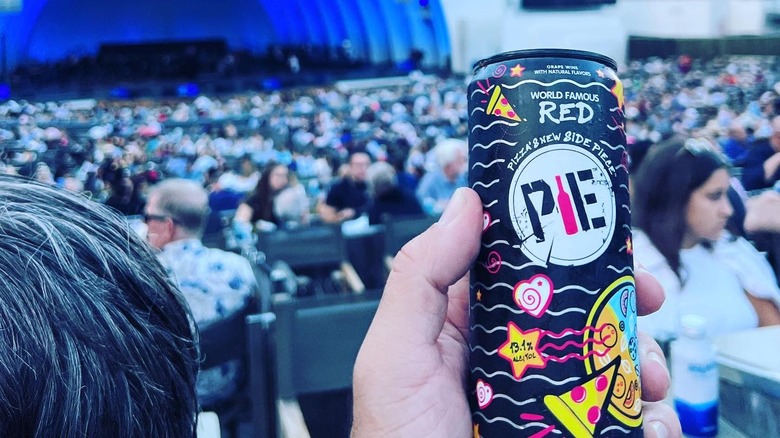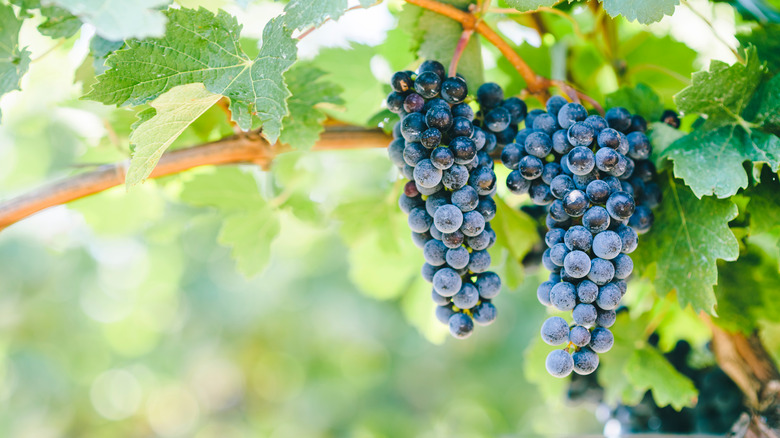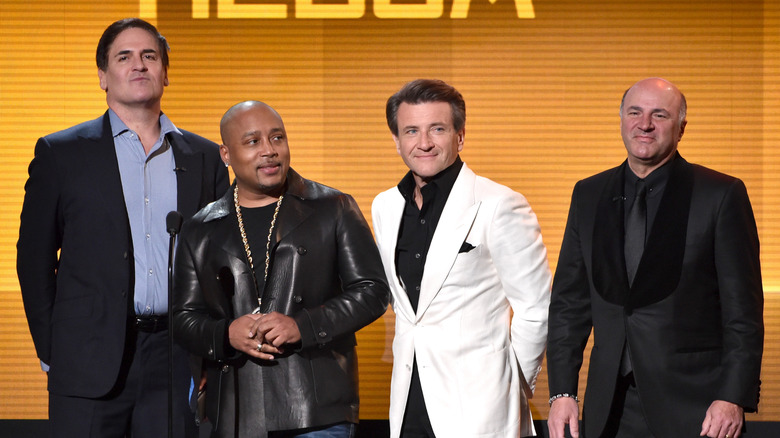Pie Wine From Shark Tank: 3 Things You Didn't Know
Season 15 of Shark Tank is coming to ABC and Hulu on September 29, and the first episode is primed for food and drink lovers. Over the years, there have been some pretty formidable food wins on Shark Tank, with Bantam Bagels and Cookie Dough Cafe among the most notable brands to score investment deals from the show's hosts. On the first episode of the new season, another startup company will attempt to join those ranks — it's called Pie Wine, and you'd never guess its niche.
Pie Wine makes wine — that much should be obvious — but there's a twist: Its drinks are specifically made to go with pizza. The brand's website bills Pie Wine as "Pizza's new side piece" and "The O.G. pizza wine." Is it an outrageously specific niche? Yes, but so are the biggest Shark Tank success stories. Plus, pizza and wine are a match made in heaven (check out our Expert's Guide to Pairing Wine With Your Favorite Pizza and see for yourself).
The trickiest aspect of Pie Wine's pitch to the Sharks could lie in a clash of aesthetics. Wine and pizza occupy very different realms of the American consciousness — pizza being the ultimate everyman food and wine being the epitome of expensive fine dining. Pie Wine's packaging alone — colorful cans etched with cartoon pizza iconography — seems at odds with wine's traditional image. But perhaps that's just what Pie Wine needs to succeed. As the brand makes its network T.V. debut, here are three things you should know.
Pie Wine was co-created by a radio host
Pie Wine is a really, really young company founded in 2022 by Josh Green and Kevin Klein. The pair have been friends for over 30 years, with a love of pizza integral to their relationship. According to Pie Wine's website, Green and Klein were driven to craft wine specifically for pizza after undertaking an "international quest" for the perfect pizza pairing and winding up dissatisfied.
While the Pie Wine founders are fresh faces on Shark Tank, Klein already has a notable media presence. He co-hosts the Klein/Ally Show every weekday morning from 5-10 a.m. on KROQ, a Greater Los Angeles radio station where Pie Wine is also headquartered. Klein has a penchant for dreaming up wild inventions, with past ideas including pizza soup, TOEsters (coasters for your feet), and disposable clothing for Benihana diners. Could Pie Wine be the thing that finally launches his career as an inventor?
For his part, Green brings a perspective more akin to the Shark Tank hosts. An alumnus of both the University of Miami Herbert Business School and School of Law, he spent years working in investment analysis, including as an Investment Banking Analyst at Merrill Lynch. Green's experience will surely help formulate a profitable yet realistic deal to ask from the Sharks.
Pie Wine comes in three varieties
Pie Wine is currently available in three flavors, intended to encompass a broad range of pizza pairings. It has a classic red wine with a sweet and savory flavor profile, intended for pairing with traditional tomato-based pies and meaty pizza toppings. The dry white wine is aimed at more complex pizzas featuring subtler herbaceous flavors and seafood-based pizzas like white clam pie.
Pie Wine's most unique offering is its signature sweet wine, dubbed "Sweet Za." Although Sweet Za is a white wine, it has been inspired by rosé, boasting a particularly sweet and fruity flavor profile. It's intended for versatile pairings, matching particularly well with lighter pizzas with white sauce. All varieties of Pie Wine are sparkling, but the company promises only "gentle carbonation."
Pie Wine comes in 12-ounce cans priced at $5 per unit. However, as of the writing of this article, the drink is only available to purchase on Pie Wine's website in packs of four or twelve. The White Wine and Sweet Za contain 10.5% alcohol by volume, whereas the Red Wine comes slightly higher at 13.1% alcohol by volume.
Pie Wine uses California Grapes
Pie Wine is based in Los Angeles, and all the grapes used to make its beverages are sourced from the state's world-renowned vineyards. This is of the utmost importance, as the region where a wine's grapes are grown has a tremendous impact on its final flavor. Thanks to the state's climate, California grapes are considered the gold standard of America's vineyards.
The environment of California's wine country closely mirrors that of Mediterranean nations like France, Italy, and Morocco, which all happen to be known for their outstanding wines. California's nutrient-rich soil has made it the top agricultural producer in the United States, and the state is responsible for 99% of all commercial grapes grown in the country.
The folks at Pie Wine certainly seem to take the technical sides of both wine and pizza seriously. Its website houses a blog packed with information about wine production, vineyard management, flavor pairings, and notable pizza styles and producers in the U.S. The duo has certainly put a great deal of effort into this fledgling business. Let's see if it's enough to score them an investment deal on Shark Tank.
Pie Wine didn't net the investment of any sharks
Pie Wine had a bit of an unusual experience on Shark Tank. Typically, when a product doesn't net the buy-in of any sharks, it's because they don't like it. In this case, though, most of them actually approved Pie Wine's product; they just had various reasons they couldn't get involved. Kevin O'Leary loved the idea, but he was soon to launch his own line of sparkling wines. Similarly, Mark Cuban had already invested in BeatBox Beverages on the show, so even though he liked the idea, it was a conflict of interest.
Lori Greiner, meanwhile, said it was too early in the product for her to get involved, while Daymond John thought competition in the market was just too fierce. Guest shark Candace Nelson, despite believing the product and branding were great, thought it was a little too specific. Even though Josh Green offered to buy any of the sharks out after one year if they weren't satisfied, they still weren't biting.
